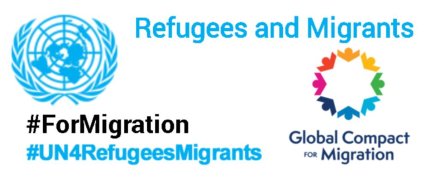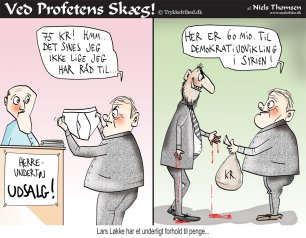On the 10th - 11th of December in Marrakech, the Danish government intends to sign yet another agreement on migration - this time in connection to a United Nations initiative. The agreement is called "Global Compact for Safe, Orderly and Regular Migration" and it is an expanded version of the first Marrakech agreement signed by the Government this past May that reads "to facilitate organized, secure, regular and responsible migration and mobility for people, including through the implementation of planned and well-managed migration policies."
The new Marrakech agreement however, is furthermore expanded with the aim that governments in the countries concerned - including Denmark - will commit themselves to promoting a certain (positive) attitude toward migration with regards to media coverage, and even gives instructions on how to report on migration and the language (wording) to use. Media that do not, according to the Government, comply with the "ethical standard" imposed, or which, according to the government, expresses "intolerance, xenophobia, racism and other forms of discrimination against migrants" must be deprived media support. This is clearly stated in the 17th aim of the agreement on page 24:
”Promote independent, objective and quality reporting of media outlets, including internetbased information, including by sensitizing and educating media professionals on migration-related issues and terminology, investing in ethical reporting standards and advertising, and stopping allocation of public funding or material support to media outlets that systematically promote intolerance, xenophobia, racism and other forms of discrimination towards migrants, in full respect for the freedom of the media”
The declaration is not legally binding, however that is less important in this context. The mere fact that the government, without any objection, intends to commit Denmark to the content of this statement, sends a clear signal that freedom of the press and freedom of expression is not considered important enough to be taken into account – according to the government.
It is furthermore disturbing to realize that this does not rest solely on this one example. In fact, it is the third time within a few years that the government has attacked our most important freedom, freedom of speech:
In 2016, Parliament passed a further restriction of section 136 of the Criminal Code, after which it was made punishable by law to agree to a number of actions within the context of religious education. Although the purpose was to limit the radicalization that takes place in a number of mosques, it was in fact an interference with freedom of expression, which could, as the case may be, have a far broader effect. In addition, the law was, in reality, pure tokenism and virtually impossible to enforce, so we in fact ended up curbing freedom of expression without actually getting any concrete good effect to offset what we had lost.
In September of this year, Justice Minister Søren Pape Poulsen proposed a bill to make further restrictions to the spy provision as laid out in section 108 of the Criminal Code, so that everyone - from chief editors of the largest media, to the common facebook user – could, in principle, be charged and sentenced up to 12 years in prison for passing on fake news and negative attitudes and stories about Danish and international authorities and institutions. A completely unheard of attack on freedom of expression that would criminalize legitimate expressions alone on the grounds that they were either lies or coincided with what foreign (Russian) intelligence services might attempt to do in order to influence public opinion.
And now, on the eve of the signing of the 2nd Marrakesh agreement, the government intends to commit itself to interfering with the work of the press by removing media support from those who do not toe the line.
We have a free press, which is a crucial part in order to maintain a free and open democracy. The government should not presume to be a judge of the media’s political standpoint, nor should they be able to withhold media support from them on the basis of attitudes or entirely legitimate news angles about the flow of migrants.
A legal expression is a legal expression - even if it may be considered xenophobic, racist or discriminatory, and even if it comes from a media. It is a basic condition in a country ruled by law with existing freedom of speech that everyone can say and write whatever they want to - as long as they do not call for or threaten violence.
The Global Conduct for Safe Migration agreement's carte blanche to the government, giving them the framework with which to judge the media's handling of migrants, is an attack on freedom of expression and freedom of the press, a freedom which ensures citizens’ access to information, and with it the ability to choose between information channels themselves in order to form their own opinion.
The proposed agreement is completely unheard of and contrary to the core values and freedoms that form the basis for us to be able to call ourselves a free and open democracy. If we attack and undermine freedom of expression, we remove the prerequisite for the gaining of knowledge in order for us to form an opinion – and to freely share that opinion.
The ease with which the government plays hazard with the most precious freedom we have is highly disturbing. I am deeply concerned, and I wonder if the politicians in general, and the government in particular, are at all aware that it is the crown jewel of democracy they are about throw to the wind.
The Free Press Society has written to both the Prime Minister, the Foreign Minister, the Minister for Justice and the Minister for Immigration and Integration, and asked for the government to withdraw from the 2nd Marrakesh agreement - or at least clearly and unequivocally disregard the wording of the 17th aim of said agreement.



